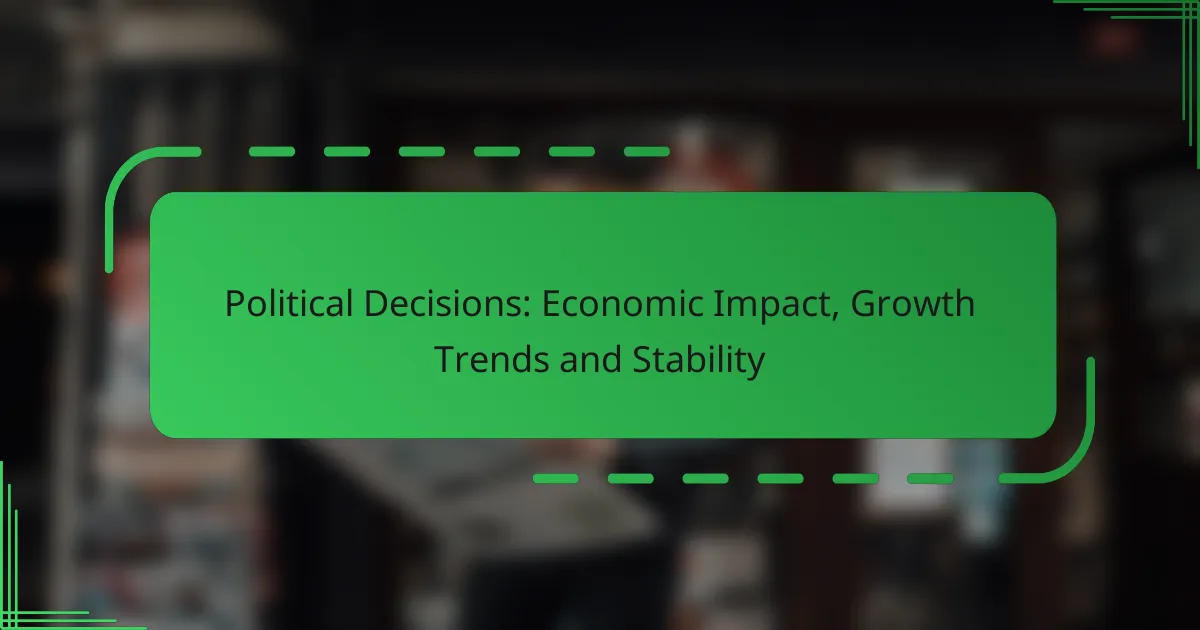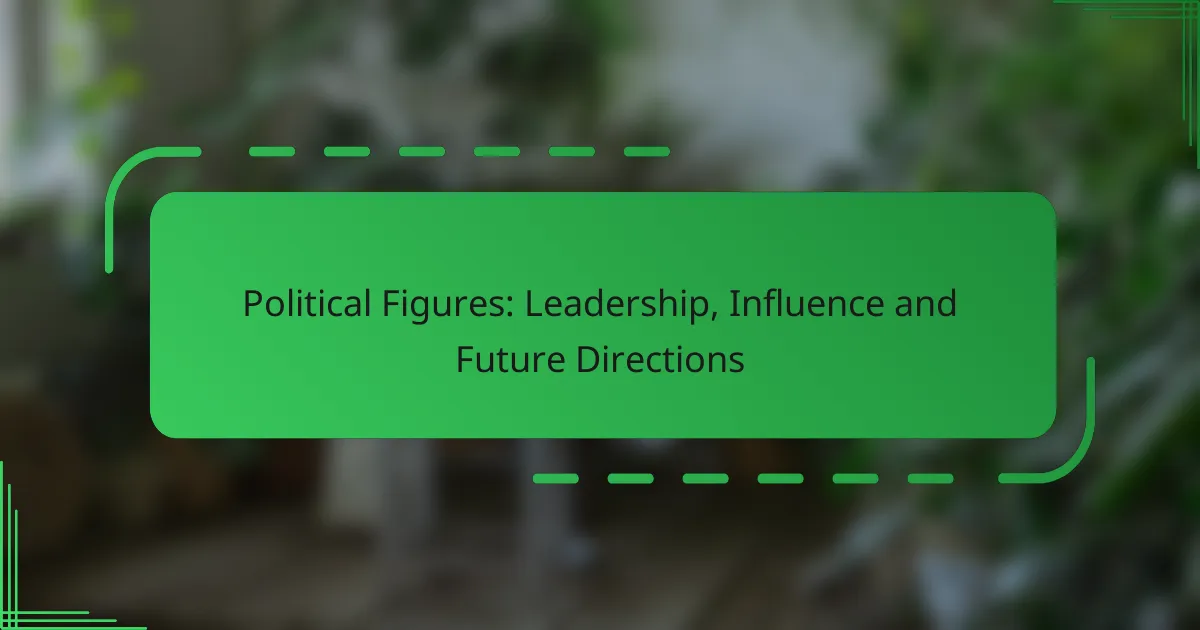Political decisions play a crucial role in shaping economic growth and stability, influencing fiscal policies, regulatory frameworks, and trade agreements. These decisions can either foster or impede economic activity, directly impacting GDP and investment levels. By understanding the trends in political decision-making, stakeholders can better anticipate shifts in the economic landscape and adjust their strategies accordingly.
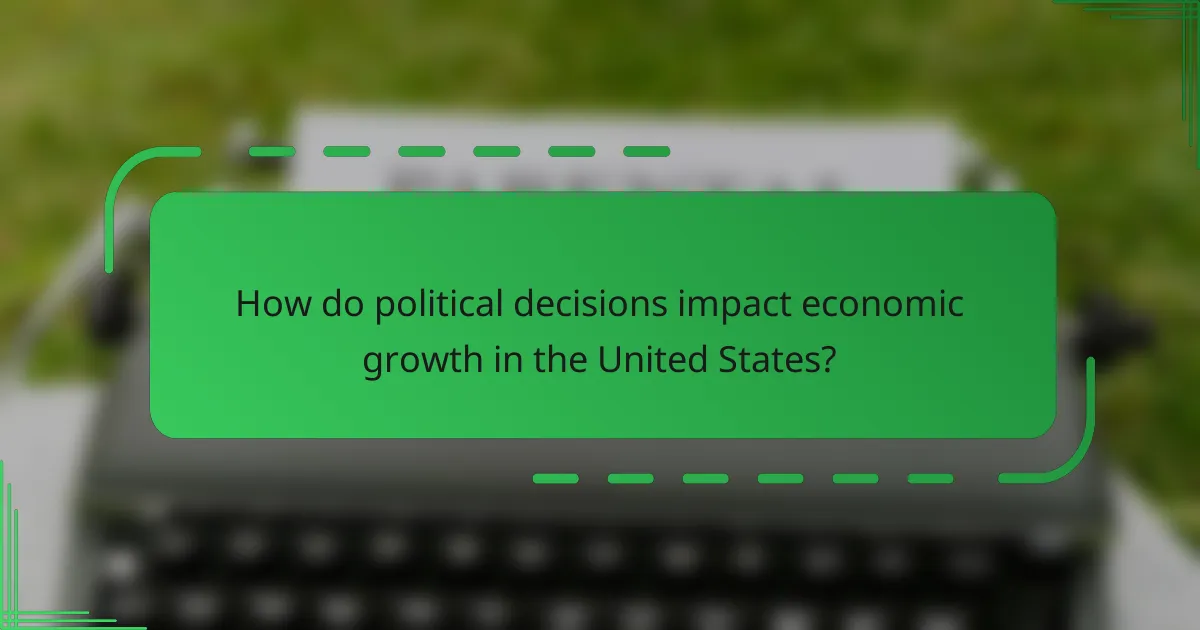
How do political decisions impact economic growth in the United States?
Political decisions significantly influence economic growth in the United States by shaping fiscal policies, regulatory environments, and trade agreements. These factors can either stimulate or hinder economic activity, affecting overall GDP and investment levels.
Influence of fiscal policy on GDP
Fiscal policy, which includes government spending and taxation, directly affects GDP growth. When the government increases spending on infrastructure or social programs, it can boost demand and create jobs, leading to higher economic output.
Conversely, high taxes can reduce disposable income for consumers and limit business investment. A balanced approach is crucial; for instance, maintaining a budget deficit during economic downturns can support recovery, while surpluses may be beneficial in times of growth.
Regulatory changes affecting business investment
Regulatory changes can either encourage or discourage business investment. Streamlined regulations often lead to increased entrepreneurial activity, as businesses face fewer barriers to entry and operational costs decrease.
On the other hand, stringent regulations can lead to higher compliance costs and deter investment. For example, environmental regulations may require significant upfront investments, which could slow down growth in certain sectors if not managed effectively.
Trade agreements and their economic implications
Trade agreements play a crucial role in shaping economic growth by determining the terms of trade between the U.S. and its partners. Favorable agreements can open new markets for American goods, leading to increased exports and job creation.
However, trade agreements can also lead to job losses in certain industries due to increased competition. It’s essential for policymakers to consider the broader economic impacts and ensure that agreements support both growth and workforce stability.
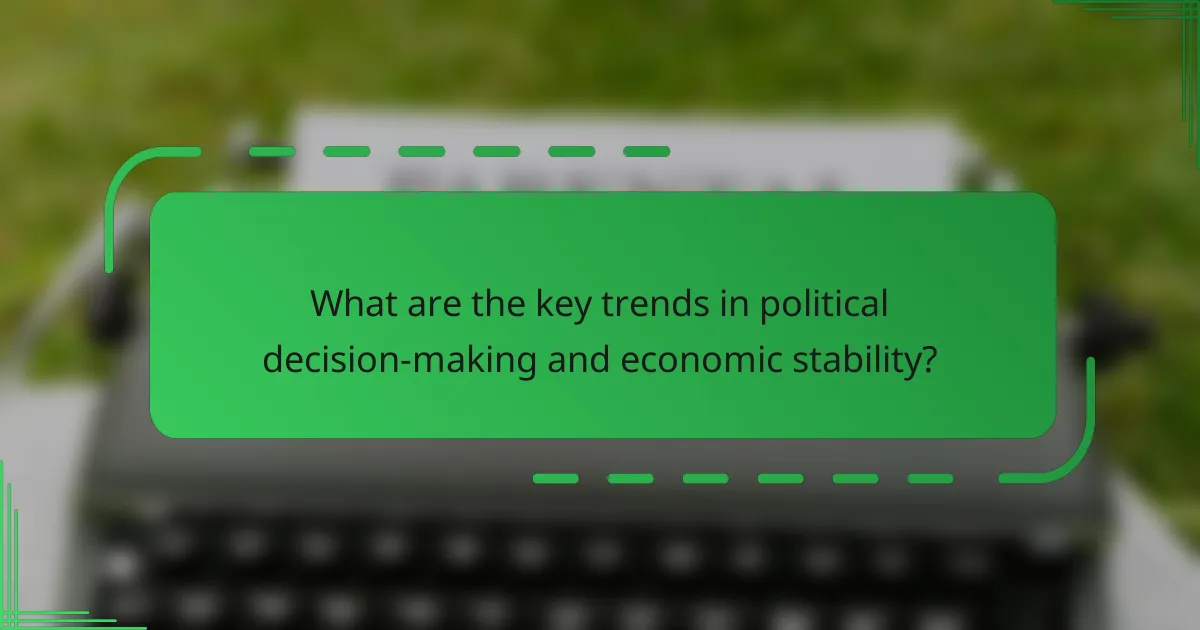
What are the key trends in political decision-making and economic stability?
Key trends in political decision-making significantly influence economic stability, shaping growth trajectories and investment climates. Understanding these trends helps stakeholders anticipate changes and adapt strategies accordingly.
Shifts in public policy priorities
Public policy priorities often shift in response to changing societal needs and political ideologies, impacting economic stability. For instance, a government may prioritize environmental regulations, which can lead to increased costs for businesses but also stimulate growth in green technologies.
These shifts can create uncertainty for investors, as policies that favor certain industries over others may alter market dynamics. Stakeholders should monitor policy changes closely to align their strategies with emerging priorities.
Impact of election cycles on economic forecasts
Election cycles can significantly affect economic forecasts, as political parties often propose different economic policies. For example, a party focused on tax cuts may boost consumer spending, while one emphasizing austerity might suppress it.
Investors and businesses should prepare for fluctuations in economic performance during election years, as uncertainty can lead to volatility in markets. Keeping an eye on candidate platforms can provide insights into potential economic directions.
Globalization and its effects on local economies
Globalization has profound effects on local economies, often leading to increased competition and market access. While this can drive growth, it may also challenge local businesses that struggle to compete with international firms.
Local economies may benefit from globalization through job creation in export-oriented sectors, but they can also face risks such as job losses in industries unable to adapt. Policymakers must balance these effects by supporting workforce development and innovation to enhance local resilience.
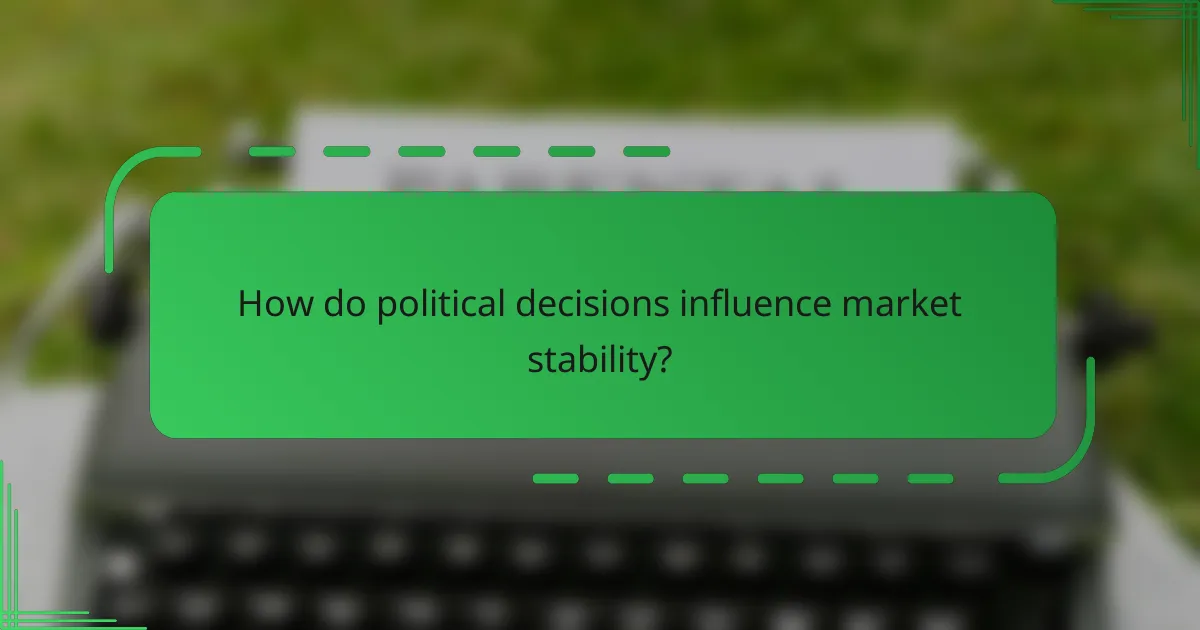
How do political decisions influence market stability?
Political decisions significantly impact market stability by shaping economic policies, regulations, and investor confidence. Changes in governance can lead to fluctuations in market performance, affecting everything from interest rates to consumer spending.
Monetary policy adjustments by the Federal Reserve
The Federal Reserve’s monetary policy decisions, such as changes in interest rates, directly influence market stability. For instance, lowering interest rates can stimulate borrowing and spending, while raising them can help control inflation but may slow economic growth.
Investors closely monitor these adjustments, as they can lead to immediate shifts in stock and bond markets. A sudden rate hike, for example, might lead to a decline in stock prices as borrowing costs increase.
Government interventions during economic crises
During economic crises, government interventions such as stimulus packages or bailouts can stabilize markets. These actions can restore consumer confidence and encourage spending, which is crucial for economic recovery.
For example, during the COVID-19 pandemic, many governments implemented fiscal measures to support businesses and individuals, which helped mitigate severe market downturns. However, excessive intervention can lead to long-term debt concerns and inflationary pressures.
Political risk assessments by investors
Investors conduct political risk assessments to gauge the potential impact of political events on market stability. Factors such as elections, policy changes, and geopolitical tensions can create uncertainty that affects investment decisions.
For instance, an upcoming election may lead to volatility in the stock market as investors speculate on potential policy shifts. Understanding these risks allows investors to make informed decisions and adjust their portfolios accordingly.
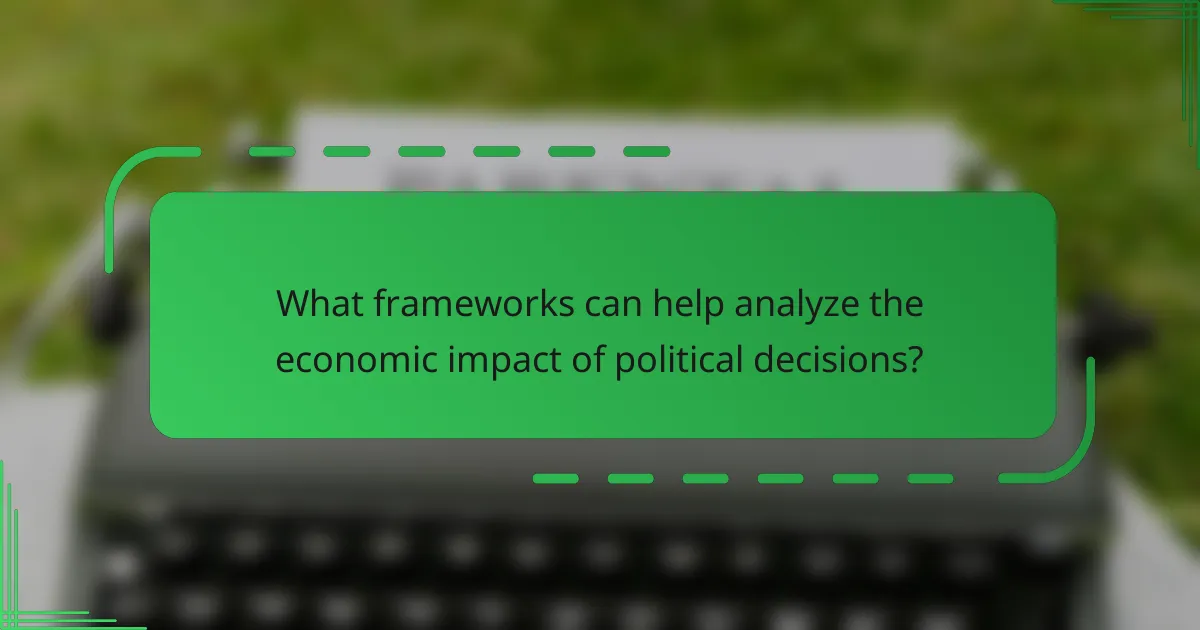
What frameworks can help analyze the economic impact of political decisions?
Frameworks such as cost-benefit analysis and economic modeling techniques are essential for evaluating the economic impact of political decisions. These tools help policymakers understand potential outcomes, trade-offs, and the overall effectiveness of proposed changes.
Cost-benefit analysis of policy changes
Cost-benefit analysis (CBA) assesses the economic advantages and disadvantages of a policy change. It involves quantifying costs and benefits in monetary terms to determine if the benefits outweigh the costs, guiding decision-making.
When conducting a CBA, consider both direct and indirect effects. For example, a new tax policy may generate revenue but could also lead to reduced consumer spending. A well-rounded analysis should include a range of scenarios to capture uncertainty.
Common pitfalls include overlooking long-term effects or failing to account for non-monetary benefits, such as improved public health. Always ensure transparency in assumptions and methodologies to enhance credibility.
Economic modeling techniques
Economic modeling techniques simulate the effects of political decisions on the economy. These models can range from simple equations to complex simulations that incorporate various economic factors and relationships.
Common models include input-output models, which analyze how changes in one sector affect others, and general equilibrium models, which assess the economy as a whole. For instance, a proposed infrastructure investment can be modeled to predict its impact on employment and GDP growth.
When using economic models, ensure they are grounded in reliable data and reflect current economic conditions. Regularly updating models with new information can improve their accuracy and relevance in policy discussions.
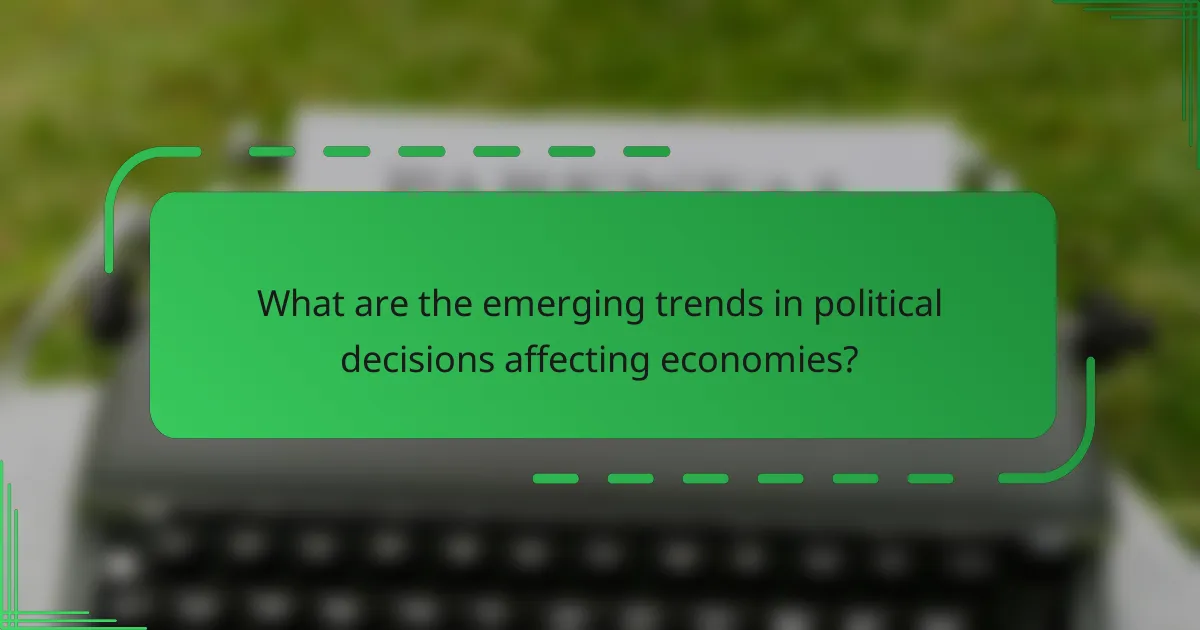
What are the emerging trends in political decisions affecting economies?
Emerging trends in political decisions are significantly reshaping economies worldwide. Key factors include the rise of populism, climate policy initiatives, and the influence of technological advancements on regulatory frameworks.
Rise of populism and its economic consequences
The rise of populism often leads to significant economic shifts, characterized by increased government intervention and protectionist policies. These changes can disrupt trade relationships and create uncertainty in markets, impacting investment decisions.
For instance, populist movements may prioritize domestic industries over international trade, potentially leading to higher prices for consumers and reduced economic growth. Countries experiencing this trend should monitor shifts in public sentiment and adjust their economic strategies accordingly.
Impact of climate policy on economic growth
Climate policy is increasingly influencing economic growth by promoting sustainable practices and renewable energy investments. Governments are implementing regulations that encourage businesses to reduce carbon footprints, which can foster innovation but may also impose costs on traditional industries.
For example, the European Union’s Green Deal aims to make the region climate-neutral by 2050, which could lead to substantial shifts in job markets and energy sectors. Businesses should adapt to these policies by investing in green technologies to remain competitive and compliant.
Technological advancements and regulatory responses
Technological advancements are driving economic change, prompting governments to develop new regulations that address emerging challenges. Innovations in artificial intelligence, blockchain, and automation require frameworks that ensure ethical use while promoting growth.
For instance, the introduction of data protection regulations like the GDPR in Europe reflects the need to balance innovation with consumer privacy. Companies should stay informed about regulatory developments to leverage technology effectively while minimizing compliance risks.
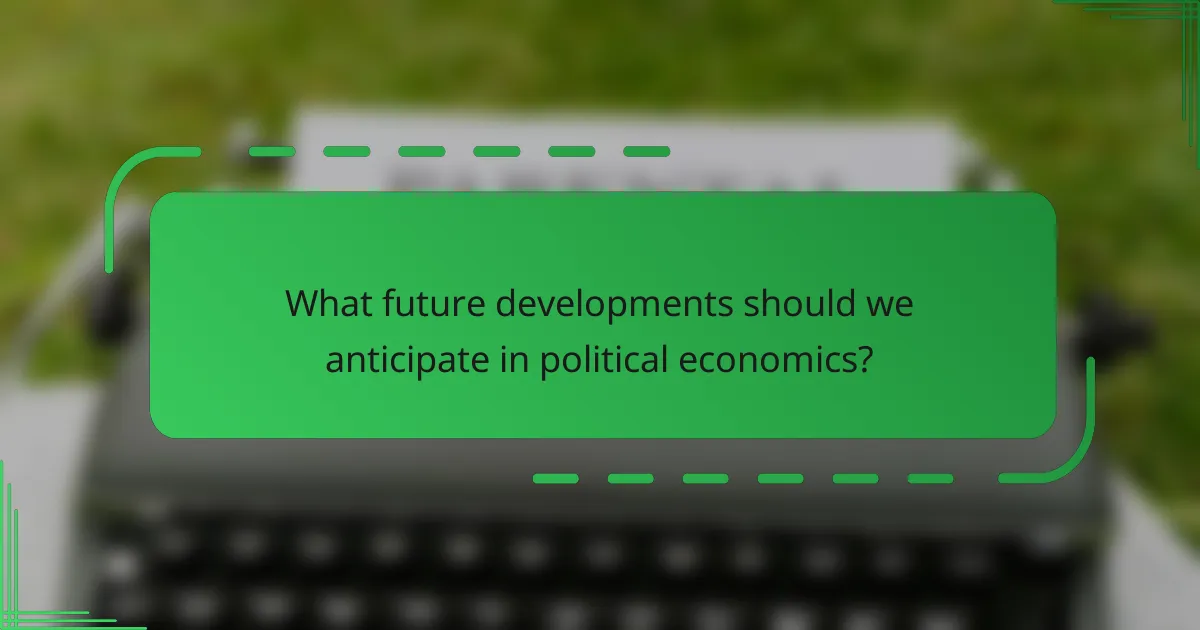
What future developments should we anticipate in political economics?
Future developments in political economics will likely focus on the interplay between government policies and economic outcomes. Key areas to watch include shifts in trade policies, demographic changes influencing governance, and the rise of new economic theories that shape decision-making processes.
Potential shifts in international trade policies
International trade policies are expected to evolve significantly as countries reassess their economic relationships. Factors such as geopolitical tensions, trade agreements, and tariffs will play critical roles in shaping these policies. For instance, nations may prioritize local production to reduce dependency on foreign supply chains.
Countries might also explore new trade partnerships, particularly in emerging markets. This could lead to a diversification of trade routes and a reconfiguration of existing agreements, impacting global supply chains and economic stability.
Long-term effects of demographic changes on policy
Demographic shifts, such as aging populations and migration trends, will significantly influence political decision-making. Governments may need to adapt policies to address the needs of an older workforce or to integrate younger immigrants into the economy. This could lead to changes in taxation, healthcare, and social security systems.
Additionally, as populations become more diverse, policies may increasingly reflect the interests of various demographic groups. This can result in more inclusive governance but may also create tensions if not managed effectively.
Emerging economic theories in political decision-making
New economic theories are emerging that challenge traditional views on political decision-making. Behavioral economics, for instance, emphasizes the impact of psychological factors on economic choices, suggesting that policymakers should consider human behavior in their strategies.
Furthermore, theories focusing on sustainability and environmental economics are gaining traction. Policymakers may increasingly prioritize green initiatives and sustainable practices, reflecting a shift towards long-term economic stability over short-term gains.
